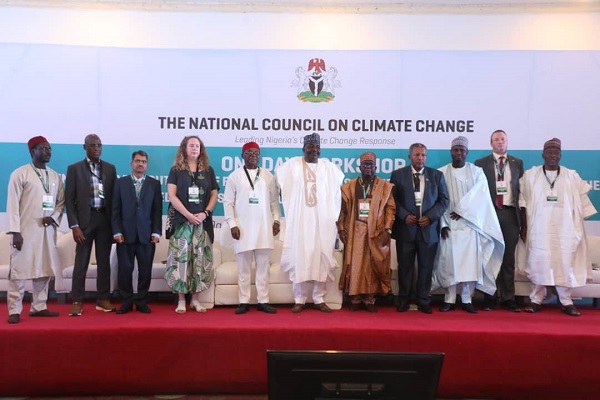
As Nigeria gears up for the 28th UN Climate Change Conference of Parties (COP 28), the Federal Government has unveiled its focus on the operationalisation of the $100 billion Loss & Damage funding. This commitment aligns with the nation’s ongoing efforts to bolster climate finance through various channels.
Vice President Kashim Shettima emphasised this objective during a workshop themed ‘Unpacking the outcomes of the 58 sessions of the subsidiary bodies of the United Nations framework convention on climate change”. The event was organised by the National Council on Climate Change (NCCC), with support from the United Nations Development Programme (UNDP), the German Agency for International Cooperation (GIZ), the Centre for Journalism Innovation and Development (CJID) and other stakeholders. The workshop took place on August 8, 2023, in Abuja.
“Our vision and expectations for COP 28 will include increased climate action on many fronts, particularly increased and accessible climate finance. We express concern about the lack of progress in mobilising the $100 billion pledged by Western countries since COP15 in 2009 for adaptation financing by 2020,” Shettima stated.
He further emphasised the necessity of finalising the Loss & Damage agreement in Dubai. This agreement holds significant hope for low-income countries grappling with the impacts of climate change. Shettima also highlighted the importance of concluding discussions on the Just Energy Transition, focusing on facilitating sustainable transitions for emerging economies while ensuring financial support and alignment with national priorities.
Despite Nigeria’s modest contribution to global carbon emissions, the vice-president acknowledged the severe impact of climate change on the country. He noted that Nigeria ranks among the ten most vulnerable countries worldwide to the consequences of climate change.
The vice-president underscored the need to address climate change’s direct effects on Nigeria, particularly in regions like the North Eastern part of the country. He highlighted challenges such as drought, desertification, erratic rainfall patterns, sandstorms and devastating floods that lead to destruction of farmlands, infrastructure and settlements.
Referring to the catastrophic floods of 2022, which incurred massive economic losses and loss of life, Shettima urged proactive measures. To prevent future disasters, he directed the National Council on Climate Change to develop a Comprehensive Climate Change Adaptation Project for Flood Management in Nigeria. This initiative should also encompass revitalising the Lake Chad Basin.

The vice-president emphasised the historical responsibility of developed countries in climate change and the need for equitable climate finance distribution. He urged the global community to honour their commitments.
He also revealed ongoing discussions between the National Council on Climate Change and various partners such as the Green Climate Fund, Nigeria Sovereign Investment Authority (NSIA), Infrastructure Corporation of Nigeria Ltd (INFRACORP), Ministry of Finance Incorporated (MOFI) and KfW Development Bank to expedite additional financing for Nigeria’s climate actions.
Director-general of the NCCC, Dr. Salisu Dahiru stressed the importance of climate change for Nigeria’s development. He highlighted the need for comprehensive preparations for COP28 and other significant meetings to ensure Nigeria’s interests and priorities are represented in the emerging agreements.
In summary, Nigeria’s participation in COP 28 aims to unlock the operationalisation of $100 billion Loss & Damage funding while advocating for increased climate action and equitable climate finance distribution. The nation’s commitment reflects its determination to address the dire impacts of climate change and foster sustainable development.
In his goodwill message, the UNDP representative, Mr. Lealem Berhanu Dinku underscored the impact of climate change which has been on the increase in the vulnerable world, even as he urged developmental partners to consider that when reaching out to support developing countries.
Dinku further pledged the UNDP’s continuous support to the government of Nigeria through environmental players, especially the Federal Minister of Environment and the NCCC in its quest to attain safe and sustainable development for Nigeria.
“Issues of climate change have been increasingly vulnerable to the world. UNDP will continue to support in such areas as collaboration and coordination, strengthening capacity building, promoting transparency and accountability. Identify barriers and solutions, and foster commitment and action,” he added.


